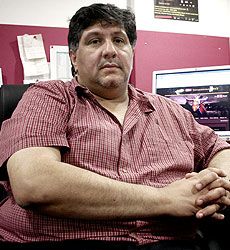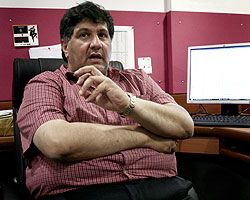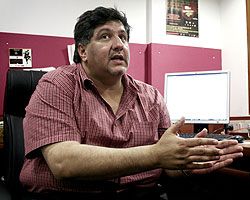


Independence Rock, arguably the oldest rock festival in the country, has been around for 23 years, becoming larger with each passing year. The fest added Bangalore and Delhi to its roster in 2007, and this year has brought Pune and Kolkata under its ambit. But, in the long innings, how has this festival helped improve the Rock Scene in India? What are the issues that need to be addressed to encourage rock bands and bring the genre to the mainstream? Radioandmusic.com's Chirag Sutar discusses the hurdles, the challenges and possible solutions, amidst all the chaos before the I-Rock Mumbai finals in a tete e tete with the face of Indian Rock Scene, Farhad Wadia, CEO, E-18.
Excerpts:
When do you start working on I-Rock?
We start working six to eight months before the show, since the festival has now reached to five new cities – arranging for sound, light and travel takes a lot of time. We have open-air shows in all five cities, and acquiring various licenses for the venues is also a time consuming process.
You have been organising I-Rock for over two decades. Are sponsors willing to shell out money, especially for a Rock concert?
Well, it is incredibly difficult to find sponsors, as it involves a lot of money. Five cities are costing us Rs 12 million, which means we have to at least raise Rs 14 million to make it entertaining and a profitable event.
Everybody is aware of the issues you have had with law enforcement agencies, when it comes to getting venues of your choice. Do you still have issues while acquiring licenses?
Acquiring licenses has been and will always be a problem in this country. To pull off an event like this, one needs 21 odd permissions, like - a Fire Brigade NOC, PWD electrical & Stage Compliance report, Collector Mumbai for Entertainment Tax Clearance, Censor Board Clearance, Loud-speaker License, and a Ticket selling license, to name a few.
But, International acts often get a venue of their choice...
That is precisely because International artistes have bigger budgets. So, for example, any event management company that is getting a renowned pop singer like Beyonce will have a minimum budget of Rs 40 million, and they can afford to pay an amount like Rs 20,00,000 in bribes. However, I-Rock has a budget of only Rs 50,00,000. We obviously cannot afford to bribe such huge amounts.
As far as the prizes go, what does the winning band get?
We have a tie up with Furtados, the winning band can buy equipment worth Rs 1,00,000s. Besides this, we give out vouchers worth Rs 40,000 to Rs 50,000 to the runners up. However, I'd like to stress that bands here don't play for money; they play here because it's the biggest festival in India. After a band gets noticed at I-Rock, colleges, organisations and corporates start calling the bands. Every band that was unknown has become a big band after playing at I-Rock. A good example is the Mumbai based band �Zero'.
Zero seems to be the only band which has made it big in the Indian Rock scene...
Well, �Zero' was not even in our list when they participated. Zero got a chance because one of the bands opted out of the show at the last moment and I was busy recording some stuff in the studio with Loy (of the Shankar – Ehsaan- Loy trio). That's when Loy mentioned his nephew Warren's band. Due to time constraints, I couldn't hear them, but I gave them a slot anyway. That's how we put on Zero, and now they have a huge following, everybody knows them, that's the reason why bands prefer to play here.
Every year, I get calls from bands and artistes who are willing to pay money or get me sponsors in order to play here. But I politely say �NO' and tell them to send in their demo records.
Why do record labels shy away from Rock music or don't give Independent rock musicians a chance?
Record music is basically a bad business, the cab driver does not buy a rock music CD, he buys a Jhankar Beats. In Kolkata, �Bangla Rock' sells better than Bollywood or Bangla film music. In Bengal, there are bands like Bhoomi and Chandra Bindu, who get good money to play at concerts in Bangladesh and West Bengal.
One of the main reasons they excel is because they are singing in their local language. Even the rickshaw driver listens to Bangla Rock. On the contrary, there are no Hindi Rock bands here, apart from Euphoria. If it can happen in Bengal, it can happen here. That is my opinion.
Do you think Indian Rock bands have any future?
Rock bands today certainly have a great future, I-Rock started 23 years ago, and back then, you couldn't do anything if you didn't have a record company backing you. Music was available in physical format, like cassettes and CDS. However, now, rock bands stand a good chance. Physical format sales have fallen more than 60 per cent. On the other hand, sales of the digital format have doubled.
To record an album costs a bomb and a fortune to book a studio. Now, the technology has become so good and so easy that I can actually record an album on my laptop. You only need a studio to record vocals. So, if you have a quiet room which is padded, you can record the vocals too. Even when it comes to buying music gear, earlier, you had to pay 300 per cent duty on the instruments. Today, it's just 30 per cent! One does not have to source instruments from abroad. A musician can easily buy a fender off the rack.
Is the digital revolution an indication that getting signed by a record label will no longer be that important?
A perfect example would be the �Arctic Monkeys', who are the product of the digital era. They were just a band with a Myspace account, and millions of users downloaded their songs from Myspace, after which record companies went and approached them. From there on, they just took off.
Famous bands like U2, Bruce Springsteen and Madonna are all leaving record labels and joining LIVE NATION- the biggest live concert business in the world. One of the reasons behind this is that it's easy for someone to download a song for free, but you can't download the experience of watching a band play. As a result, the concert ticket sales are going through the roof and all artistes are moving to the live concert labels and signing 360 degree deals. This includes the live performance and merchandise.
Earlier, the record companies used to be a roadblock. It was like a tap and how much the public opened is what the public got. Today, it's more like a sea. Also, if you observe, the record company as a business model is dead. The biggest record company in the world today is i-tunes. And, it's available in a �non-physical' format!
However, Indian Rock Bands don't make enough money; they often end up playing at pubs..
Previously, artistes used to make money on album sales. However, today they make it on concerts and live shows. If you look at the Indian Pop music scene, you'll observe that the artiste releases a video as it helps him get noticed. After this, corporates and event management companies invite him. So, an artiste makes money playing live, and not on the albums. It's a loss making proposition to release an album. There's nothing to earn.
Do you think if bands sing in their mother tongue or any Indian language, it will help them sell?
At present, we are trying to ape the west and that is our failing, because there are only the elite few who listen to it . Also, this rock music is a city phenomenon or a metro phenomenon. Even though this is a country specific issue, I think singing in your own language should help. For instance, Thai and Chinese Rock bands are massive, they sing in their own language. India is also opening to this idea; we now have a Malyali Rock Band – Avial, who will also be playing for I-Rock. I am not biased - if you are a good musician, if your band sounds good, we put them on. I don't care about the language in which a band sings.
KK's first album was a great rock album. The song Aap ki Dua is a straight rock song. We need to push boundaries in order to evolve, that is how the capital works. We don't have a mature and an evolved market for rock music; it's a niche a business.
Don't you feel that a majority of bands have only been performing covers? Is I-Rock asking the bands to play original music?
Earlier, if the band played original music, the audience would boo you off the stage. All they wanted to hear was covers. However, I think that is changing drastically. 20 years on, the audience encourages it. People are appreciating original music.
I-Rock as a festival does not dictate any rules as far as their set list goes. They can play anything that they want - it can be anything original or covers. I don't tell them what to do, I don't think that's my job. My job is put up a great show - a great act!
In this age of plagiarism, music directors often lift tunes. How can an amateur band or a solo artiste who doesn't have much money to copyright his music still make sure that his original music is not lifted?
A very simple way to do this is to register - post the CD of your original music with your signature and post it to your own self. After you receive the registered mail, keep it as it is, without opening the seal, so even if some other person listens to it and copies it, the original composer will still have the proof with the stamped date of the post office and the signature.
There is news that �Woodstock' is coming to India.
One of the organisers – Artie Cornfeld, is looking for some sitting duck who will pay him good money. They were willing to offer me money for my name. I refused!